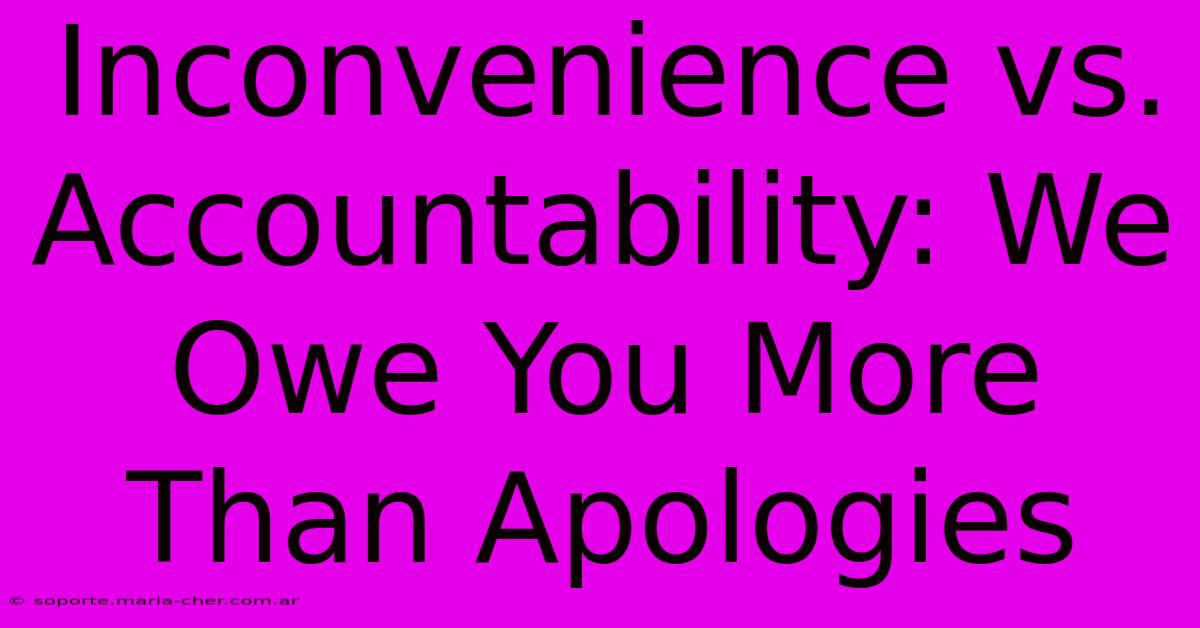Inconvenience Vs. Accountability: We Owe You More Than Apologies

Table of Contents
Inconvenience vs. Accountability: We Owe You More Than Apologies
Let's be honest. A simple "sorry" often feels insufficient when a business, product, or service fails to meet expectations. While apologies have their place, they shouldn't be the end of the conversation, especially when genuine inconvenience transforms into a deeper issue of accountability. This article delves into the crucial difference between acknowledging inconvenience and accepting accountability, emphasizing what customers truly deserve beyond empty gestures.
The Hollow Ring of "Sorry"
We've all been there. A delayed flight, a faulty product, a website crash – the inconvenience is real, and the resulting frustration is palpable. A quick apology might initially soothe the immediate sting, but it often feels hollow if not accompanied by concrete actions. A sincere apology is a starting point, not a finish line. It's the equivalent of putting a band-aid on a gaping wound.
Why Apologies Alone Fail
- Lack of tangible solutions: An apology without a plan to rectify the situation leaves customers feeling unheard and undervalued. It reinforces a sense that their concerns are not being taken seriously.
- Ignoring the root cause: A simple "sorry" avoids addressing the underlying problem that caused the inconvenience in the first place. This inaction suggests a lack of commitment to preventing future occurrences.
- Perceived insincerity: When apologies feel generic or robotic, customers sense a lack of genuine remorse. This can damage brand trust and loyalty more than the initial inconvenience itself.
Beyond Apologies: Embracing Accountability
True accountability moves beyond a simple acknowledgment of error. It demonstrates a commitment to:
1. Effective Problem Solving
This means proactively addressing the issue and offering practical solutions. For example, if a product is faulty, replace it immediately and without hassle. If a service is disrupted, provide clear communication and alternative options. Don't just say you're sorry; show customers you're actively working to fix the problem.
2. Transparent Communication
Keep customers informed every step of the way. Open and honest communication regarding the issue, the steps being taken to resolve it, and the expected timeline builds trust and shows customers you value their time and patience. Regular updates, even if the progress is slow, are essential.
3. Fair Compensation
Depending on the severity of the inconvenience, fair compensation might be necessary. This could include refunds, discounts, upgrades, or other gestures that demonstrate a commitment to making things right. The focus should be on restoring customer faith and goodwill.
4. Preventive Measures
Accountability extends to preventing future incidents. Once the immediate problem is resolved, analyze the situation to identify the root cause and implement measures to prevent similar issues from happening again. This demonstrates a proactive approach to customer satisfaction.
Building Lasting Relationships Through Accountability
In today's competitive marketplace, customer loyalty is paramount. Simply apologizing for inconveniences is no longer enough. Businesses need to demonstrate genuine accountability, showing that they value their customers and are committed to providing a positive experience. This proactive approach not only resolves immediate problems but also fosters long-term trust and loyalty. Remember, a satisfied customer is a returning customer.
In conclusion, while apologies are important, they are only the first step towards building strong customer relationships. True accountability means taking responsibility for mistakes, offering concrete solutions, and actively working to prevent future problems. This is how you earn customer trust and loyalty – and it's more valuable than any apology.

Thank you for visiting our website wich cover about Inconvenience Vs. Accountability: We Owe You More Than Apologies. We hope the information provided has been useful to you. Feel free to contact us if you have any questions or need further assistance. See you next time and dont miss to bookmark.
Featured Posts
-
Golden Gates A Passageway To 18 Karat Enchantment
Feb 08, 2025
-
The Ultimate Guide To Lying And Getting Away With It
Feb 08, 2025
-
The Saints Logo Through The Decades A Chronicle Of Triumphs And Tribulations
Feb 08, 2025
-
Witness The Art Of Natures Canvas The Ultimate Guide To Landscape Photography
Feb 08, 2025
-
Elevate Your Style How Chunky Rings Can Make A Statement
Feb 08, 2025
